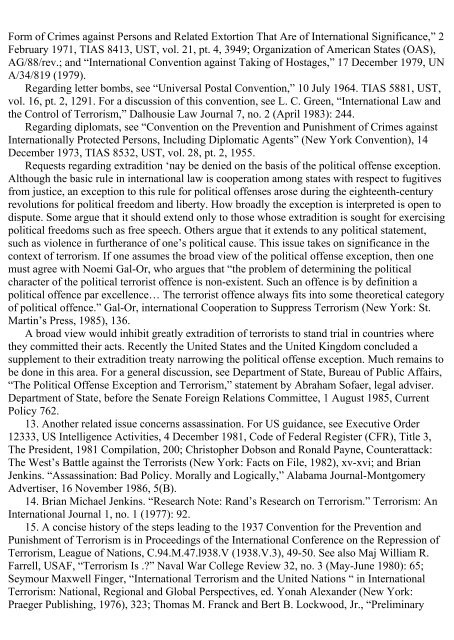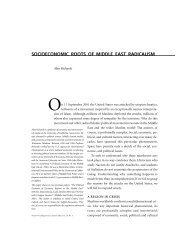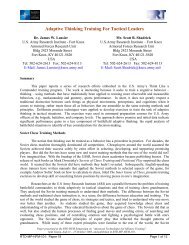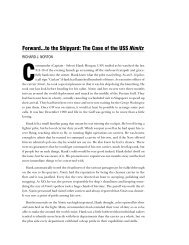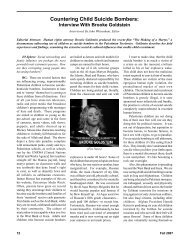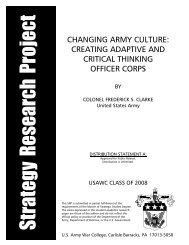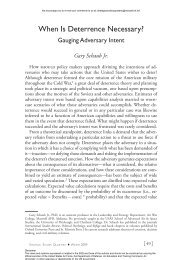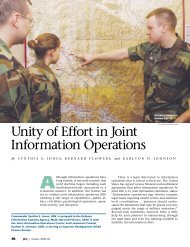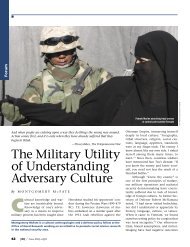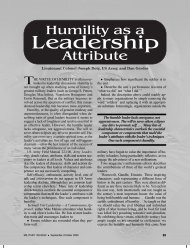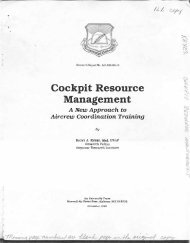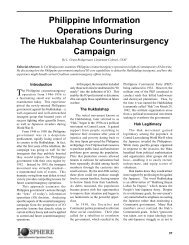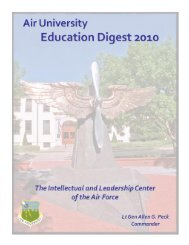Legitimate use of military force against state-sponsored - Air University
Legitimate use of military force against state-sponsored - Air University
Legitimate use of military force against state-sponsored - Air University
Create successful ePaper yourself
Turn your PDF publications into a flip-book with our unique Google optimized e-Paper software.
Form <strong>of</strong> Crimes <strong>against</strong> Persons and Related Extortion That Are <strong>of</strong> International Significance,” 2<br />
February 1971, TIAS 8413, UST, vol. 21, pt. 4, 3949; Organization <strong>of</strong> American States (OAS),<br />
AG/88/rev.; and “International Convention <strong>against</strong> Taking <strong>of</strong> Hostages,” 17 December 1979, UN<br />
A/34/819 (1979).<br />
Regarding letter bombs, see “Universal Postal Convention,” 10 July 1964. TIAS 5881, UST,<br />
vol. 16, pt. 2, 1291. For a discussion <strong>of</strong> this convention, see L. C. Green, “International Law and<br />
the Control <strong>of</strong> Terrorism,” Dalhousie Law Journal 7, no. 2 (April 1983): 244.<br />
Regarding diplomats, see “Convention on the Prevention and Punishment <strong>of</strong> Crimes <strong>against</strong><br />
Internationally Protected Persons, Including Diplomatic Agents” (New York Convention), 14<br />
December 1973, TIAS 8532, UST, vol. 28, pt. 2, 1955.<br />
Requests regarding extradition ‘nay be denied on the basis <strong>of</strong> the political <strong>of</strong>fense exception.<br />
Although the basic rule in international law is cooperation among <strong>state</strong>s with respect to fugitives<br />
from justice, an exception to this rule for political <strong>of</strong>fenses arose during the eighteenth-century<br />
revolutions for political freedom and liberty. How broadly the exception is interpreted is open to<br />
dispute. Some argue that it should extend only to those whose extradition is sought for exercising<br />
political freedoms such as free speech. Others argue that it extends to any political <strong>state</strong>ment,<br />
such as violence in furtherance <strong>of</strong> one’s political ca<strong>use</strong>. This issue takes on significance in the<br />
context <strong>of</strong> terrorism. If one assumes the broad view <strong>of</strong> the political <strong>of</strong>fense exception, then one<br />
must agree with Noemi Gal-Or, who argues that “the problem <strong>of</strong> determining the political<br />
character <strong>of</strong> the political terrorist <strong>of</strong>fence is non-existent. Such an <strong>of</strong>fence is by definition a<br />
political <strong>of</strong>fence par excellence… The terrorist <strong>of</strong>fence always fits into some theoretical category<br />
<strong>of</strong> political <strong>of</strong>fence.” Gal-Or, international Cooperation to Suppress Terrorism (New York: St.<br />
Martin’s Press, 1985), 136.<br />
A broad view would inhibit greatly extradition <strong>of</strong> terrorists to stand trial in countries where<br />
they committed their acts. Recently the United States and the United Kingdom concluded a<br />
supplement to their extradition treaty narrowing the political <strong>of</strong>fense exception. Much remains to<br />
be done in this area. For a general discussion, see Department <strong>of</strong> State, Bureau <strong>of</strong> Public Affairs,<br />
“The Political Offense Exception and Terrorism,” <strong>state</strong>ment by Abraham S<strong>of</strong>aer, legal adviser.<br />
Department <strong>of</strong> State, before the Senate Foreign Relations Committee, 1 August 1985, Current<br />
Policy 762.<br />
13. Another related issue concerns assassination. For US guidance, see Executive Order<br />
12333, US Intelligence Activities, 4 December 1981, Code <strong>of</strong> Federal Register (CFR), Title 3,<br />
The President, 1981 Compilation, 200; Christopher Dobson and Ronald Payne, Counterattack:<br />
The West’s Battle <strong>against</strong> the Terrorists (New York: Facts on File, 1982), xv-xvi; and Brian<br />
Jenkins. “Assassination: Bad Policy. Morally and Logically,” Alabama Journal-Montgomery<br />
Advertiser, 16 November 1986, 5(B).<br />
14. Brian Michael Jenkins. “Research Note: Rand’s Research on Terrorism.” Terrorism: An<br />
International Journal 1, no. 1 (1977): 92.<br />
15. A concise history <strong>of</strong> the steps leading to the 1937 Convention for the Prevention and<br />
Punishment <strong>of</strong> Terrorism is in Proceedings <strong>of</strong> the International Conference on the Repression <strong>of</strong><br />
Terrorism, League <strong>of</strong> Nations, C.94.M.47.l938.V (1938.V.3), 49-50. See also Maj William R.<br />
Farrell, USAF, “Terrorism Is .?” Naval War College Review 32, no. 3 (May-June 1980): 65;<br />
Seymour Maxwell Finger, “International Terrorism and the United Nations “ in International<br />
Terrorism: National, Regional and Global Perspectives, ed. Yonah Alexander (New York:<br />
Praeger Publishing, 1976), 323; Thomas M. Franck and Bert B. Lockwood, Jr., “Preliminary


